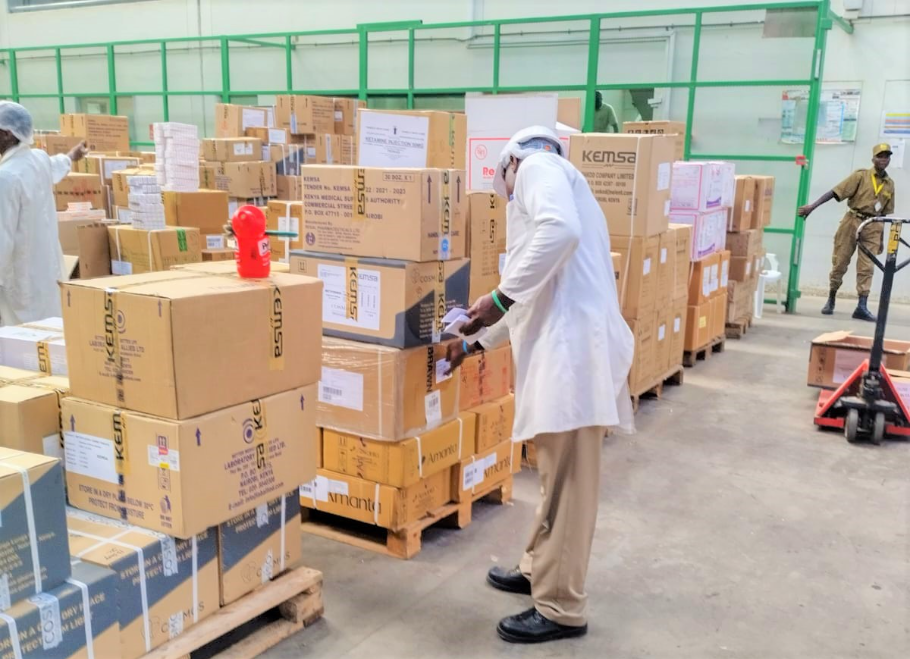KEMSA clarifies on queries in Auditor General’s Report
Auditor General Report

NAIROBI, Kenya Aug 17 – The Kenya Medical Supplies Authority (KEMSA) has denied allegations of widespread mismanagement and the loss of billions of shillings, following a report by the Office of the Auditor General.
The report highlights suspected financial irregularities and legal violations involving top management at the Authority.
But the agency has denied the claims, asserting that many of the issues raised by the auditor general as reported in a section of the media were inaccurate and misleading.
“The Authority would like to clarify that a number of issues reported are inaccurate, non-factual, misleading, and misrepresent the activities implemented during the said period,” the agency said in a statement to media houses on Friday. It said it responded to all queries raised by the Auditor General.
Addressing allegations concerning the lack of progress despite a Sh300 million budget allocation, KEMSA clarified that the funds were designated for the procurement of an Enterprise Resource Planning (ERP) system. The Authority stated that the ERP system has already been developed, with training currently underway, and it is expected to go live by December 18, 2024.
KEMSA also reiterated its role as an agent of the Ministry of Health, responsible for the procurement, warehousing, and distribution of Health Products and Technologies (HPTs). The Authority emphasized that partnership agreements are made through the Ministry of Health.
KEMSA has been criticized for allegedly receiving Sh300 million for management reforms that have yet to be fully implemented. The report highlighted delays in the proposed reforms, but KEMSA did not directly address these concerns in its statement.
On the issue of diverting maritime personnel supplies to health facilities, KEMSA clarified that it acted under instructions from the Ministry of Health to procure both antiretrovirals (ARVs) and vaccines under a single Authority to Incur Expenditure (AIE). These items were recorded under KEMSA’s National AIDS and STI Control Programme (NASCOP) commodities and were partially issued. The Authority pledged to follow up with the Ministry for the full distribution list.
Responding to allegations of excessive procurement worth Sh3.5 billion, KEMSA explained that all procurement requests are based on projected demand at the time. However, the Authority noted that fluctuations in demand, due to various factors, could lead to either overstocking or understocking of certain commodities. Delays in delivery from suppliers also impact stock levels, KEMSA added.
The Authority also addressed claims of issuing health products to Kenyans before proper testing. KEMSA asserted that all procured products undergo sampling, inspection, and testing in accordance with Quality Assurance procedures. The testing criteria vary depending on the product, with some requiring Pharmacopeia analysis, while others may only need visual inspection. KEMSA highlighted that it operates an ISO-certified laboratory and collaborates with agencies like the National Quality Control Laboratory (NQCL) for further product testing.
KEMSA was also accused of delivering Sh572 million worth of supplies to non-existent health facilities. In response, the Authority explained that it is responsible for procuring, warehousing, and distributing HPTs for prescribed public health programs. The 23 counties and 275 sub-counties in question have centralized stores where KEMSA delivered the specified HPTs. These centralized stores, although not actual health facilities, were created during the COVID-19 pandemic as delivery points at the request of counties.
KEMSA refuted claims of sending supplies worth Sh56 million to private hospitals and billing counties or the Ministry of Health (MoH) for them. The Authority clarified that ARVs are delivered free of charge, courtesy of development partners such as the Global Fund and USAID, as part of efforts to combat HIV/AIDS, tuberculosis, and malaria.
Regarding the reported loss of Sh168 million due to a change in Global Fund procurement processes, KEMSA acknowledged the loss of revenue from procurement fees when the Global Fund shifted procurement to Wambo.org. However, KEMSA stated that it still manages the warehousing and distribution of mosquito nets, earning fees for these services.
Finally, KEMSA addressed concerns about procurement irregularities, stating that all contract extensions were granted in compliance with Section 88 of the Public Procurement and Asset Disposal Act (PPADA) 2015, as revised in 2022. The Authority attributed delays in order processing to budgetary constraints, which were prioritized for pending bills. KEMSA asserted that all procurement during the financial year was conducted in strict compliance with the PPADA 2015, using various procurement methods as outlined in the Act.
The Authority maintained that any excessive procurement, including the Sh3.5 billion in question, was based on projected demand at the time, with changes in demand leading to either overstocking or understocking of certain commodities.